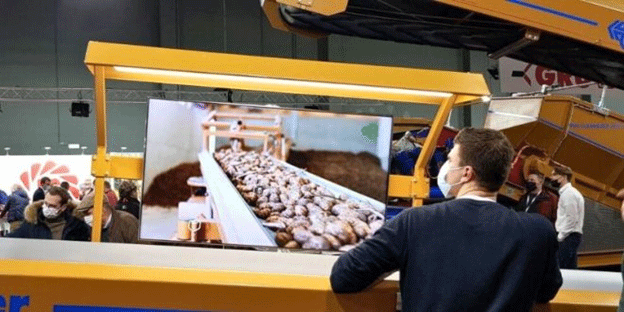The potato industry is at a critical juncture, facing pressures that demand swift adaptation. Climate change, regulatory shifts, increasing disease threats, fluctuating energy prices, and the need for sustainable operations are transforming the way farmers, agronomists, and engineers approach potato farming. To remain competitive and resilient, the industry must embrace new technologies and invest in innovation.
Belgium’s potato industry serves as a global model for forward-thinking agriculture. Known for its effective long-term planning, Belgium is home to some of the most advanced practices in potato farming. The upcoming InterPom’24, set to take place on November 24-26, 2024, in Kortrijk, Belgium, will highlight these innovations and the energy driving change within the sector.
Under the theme “Energizing a Potato Industry in Transition,” InterPom’24 will host 330 exhibitors from 15 countries. This event will showcase a wide array of products, services, and technologies, offering solutions for every part of the potato supply chain, from planting and harvesting to processing and distribution.
The Pressing Issues Facing the Potato Industry
1. Climate Change
One of the biggest challenges for potato growers today is adapting to the effects of climate change. Shifting weather patterns, extreme temperatures, and unpredictable rainfall have increased stress on crops. Potatoes, which are particularly sensitive to water availability, face heightened risks from both drought and flooding.
A 2023 report by the Food and Agriculture Organization (FAO) noted that global potato yields could decline by up to 20% in regions most vulnerable to climate change unless significant adaptation measures are taken. These include adopting drought-resistant varieties, improving irrigation techniques, and utilizing precision farming tools.
2. Tighter Regulations
New regulations, particularly around pesticide use and water management, are creating additional pressures on farmers. The European Union, for example, has implemented stricter rules on the use of certain chemicals, which has forced farmers to seek alternative pest control methods.
At InterPom’24, exhibitors will likely present sustainable farming practices and biotechnological solutions designed to reduce dependency on traditional agrochemicals while maintaining crop yields. These innovations will be crucial for ensuring compliance with evolving regulations and protecting the environment.
3. Rising Disease Pressure
Diseases such as potato blight and nematode infestations continue to threaten global potato production. As climates become warmer and wetter in some regions, the risk of disease outbreaks increases. The need for resistant varieties and integrated pest management (IPM) strategies is more urgent than ever.
InterPom’24 will provide a platform for discussing these challenges, with many exhibitors expected to display solutions such as disease-resistant potato varieties, advanced monitoring systems, and biological pest control methods.
4. Shifting Energy Prices
Energy costs, which are critical for irrigation, refrigeration, and processing, have been volatile in recent years. The conflict in Ukraine, for example, has caused spikes in energy prices across Europe, affecting the cost structures of potato producers. This unpredictability has heightened the need for energy-efficient technologies and renewable energy solutions in agriculture.
Exhibitors at InterPom’24 will showcase energy-saving technologies such as solar-powered irrigation systems, energy-efficient machinery, and innovations in cold storage to help farmers manage costs more effectively.
Innovating for Sustainability and Profitability
The potato industry’s transition towards more sustainable and efficient operations is not just about overcoming challenges—it’s about seizing new opportunities. Digital technologies such as artificial intelligence, precision agriculture, and automation offer transformative potential. By using sensors and data analytics, farmers can make more informed decisions, optimize resource use, and reduce waste.
Belgium’s potato sector, in particular, is leading the charge in digital transformation. Belgian farmers have been early adopters of precision farming techniques, using real-time data to monitor soil conditions, adjust irrigation levels, and predict disease outbreaks before they occur. These technologies not only enhance sustainability but also improve profitability by increasing yields and reducing input costs.
A Future Driven by Innovation
The potato industry is evolving rapidly, driven by the need to address environmental challenges, comply with tighter regulations, manage rising disease pressures, and adapt to volatile energy prices. Events like InterPom’24 are critical for sharing knowledge and showcasing the latest innovations that will help the sector transition into a more sustainable and resilient future.
As farmers, agronomists, and agricultural engineers gather in Belgium this November, the solutions presented will shape the future of the potato industry worldwide. By embracing new technologies and sustainable practices, the industry can thrive in the face of these ongoing challenges.







